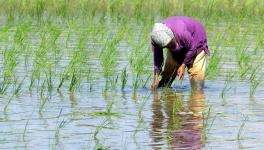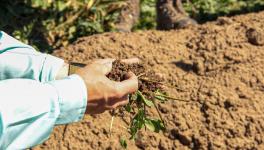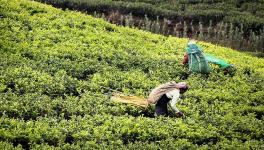Can Eating Organic Help Prevent Parkinson’s Disease?
Agricultural workers in the United States currently use more than 400 different pesticides on their crops to ensure “higher yields and improved product quality.” These pesticides, however, threaten the health of people who work with them on farms or agricultural land and of those who live near these areas. Two of the most dangerous pesticides that are still in use in the U.S. are paraquat and rotenone. Exposure to these pesticides was found to lead to an increased risk of developing Parkinson’s disease, according to various studies.
Paraquat was first commercially produced in 1961 and is used to destroy weeds and grasses resistant to glyphosate, another toxic pesticide sold across the country under the name Roundup. As for rotenone, it was formulated in 1895, but it was only during the last century that it started being employed on a large scale to get rid of unwanted herbs and pests.
Paraquat is extremely dangerous and poisonous, and a single sip of this pesticide can immediately cause death. For this reason, it is a “restricted use pesticide,” which means that agricultural workers who intend to use it have to undergo special training before “mixing, loading, and/or applying paraquat.” During this special training, people who work with this pesticide are taught about the toxicity of paraquat, how to apply it safely to crops, and how to minimize exposure while working with it.
However, even if paraquat is used correctly, it can still cause significant health risks for agricultural workers. When they take off their protective equipment, vapours of paraquat from the crops can easily travel with them to their farms or homes. And there is also the danger of workers unavoidably inhaling the pesticide. Paraquat can also infiltrate groundwater and soil, causing serious environmental damage.
Why Do Authorities Still Allow the Use of Paraquat?
Paraquat is applied to more than 100 crops throughout the country. Developing a pesticide as effective as paraquat is hard work. This is one of the reasons why the Environmental Protection Agency (EPA) continues to allow the use of paraquat in the United States. Presently, paraquat is banned in more than 50 countries, including China, the United Kingdom, Thailand and the European Union. Nevertheless, it remains one of the most widely used pesticides in developed countries like the United States and Australia.
Unsettlingly, more than 8 million pounds of paraquat is used throughout the U.S. every year, according to a 2019 press release by the Center for Biological Diversity, with California ranking first as the state using the most pesticides in the U.S., according to the 2016 data provided by the U.S. Geological Survey (USGS), which was published by Priceonomics. California made up for more than 11% of all pesticides used nationally. The state “[used] nearly twice as much as the second-ranking state, Washington,” according to Priceonomics.
Paraquat is still used on crops because it spares agricultural workers “arduous labor,” according to Syngenta, an agricultural company that produces paraquat. The pesticide also “[protects] against invasive weeds and [helps] produce agronomically important crops like soy, corn and cotton.” Given the popularity of the pesticide, paraquat can be found on the market under numerous brand names, including, Blanco, Gramoxone, Devour, Parazone and Helmquat.
In 2019, the EPA stated in a draft report on paraquat that there is “insufficient evidence” to link the pesticide to human health concerns. As a result, the agency deemed paraquat safe for use in the United States as a “Restricted Use Product.” In 2019, Representative Nydia Velázquez (D-NY) introduced the Protect Against Paraquat Act, which seeks to prohibit the sale and use of paraquat in the country. There has, unfortunately, been no further substantial progress relating to the bill since then.
As of early 2021, the EPA has been considering renewing its approval for paraquat. The agency is expected to make a decision on this issue by the end of 2022. In the meantime, the EPA advises people to take the following precautions until new regulations come into effect:
- Paraquat must be used only by a certified applicator who has undergone the required special training.
- Paraquat should never be stored in a food or drink container so as not to be mistaken for a product that can be ingested.
- Paraquat must always be kept away from children, as there have been several cases of accidental poisoning.
- Paraquat should ideally not “be stored in or around residential [buildings].”
- Paraquat must “[n]ever be used around home gardens, schools, recreational parks, golf courses or playgrounds.”
The Link Between Paraquat Exposure and Parkinson’s Disease
Even though the EPA states there is insufficient evidence to support the link between paraquat exposure and Parkinson’s disease, numerous reputable medical studies beg to differ. For instance, according to a Farming and Movement Evaluation (FAME) study, which included 110 people who had developed Parkinson’s disease and 358 matched controls, there is a link between rotenone and paraquat and Parkinson’s disease. “People who used either pesticide developed Parkinson’s disease approximately 2.5 times more often than non-users,” stated a press release by the National Institutes of Health, one of the agencies that was involved with this study.
Parkinson’s disease is a disorder affecting the brain “that leads to shaking, stiffness, difficulty with walking, balance, and coordination,” according to the National Institute on Aging. The symptoms “usually begin [appearing] gradually and get worse over time.” Regular exposure to paraquat is known to cause Parkinson’s disease by increasing the risk of developing the disease by a whopping 250%, according to a 2018 study by Canada’s University of Guelph. A medical study published in the American Journal of Epidemiology revealed that exposure to paraquat and another pesticide called maneb within 1,600 feet of a home heightened the risk of developing Parkinson’s disease by 75%.
People heavily exposed to paraquat who are susceptible to developing Parkinson’s disease include agricultural workers, farmers, people working on animal farms, individuals who reside on farms, and people who live in a rural area and drink well water. Additionally, people working as chemical mixers and tank fillers are also at risk of developing Parkinson’s disease due to their contact with paraquat.
Drinking well water from a location close to a crop to which paraquat has been applied can be dangerous because the pesticide can easily reach the groundwater. Those frequently exposed to paraquat-contaminated water are at risk for the gradual accumulation of the pesticide in their bodies, posing a health danger.
When someone is exposed to paraquat, the pesticide tends to travel through the lungs or the stomach and eventually reaches a portion of the brain medically known as the substantia nigra region. This brain region is responsible for releasing dopamine, a crucial neurochemical that plays a significant role in how many systems of the central nervous system function—from movement control to cognitive executive functions. Once paraquat reaches the substantia nigra region, it depletes the neurons that produce dopamine, a process that is associated with Parkinson’s disease. The damage caused by paraquat to these neurons can ultimately result in the impairment of essential brain functions.
The Future Is Organic
Because fruits, vegetables and cereals harvested from organic crops have been treated with natural and synthetic pesticides, which are less likely to cause health problems, they are the perfect alternative to conventionally grown produce. Natural and synthetic pesticides are not as toxic as paraquat or glyphosate and include copper hydroxide, horticultural vinegar, corn gluten, neem and vitamin D3. Furthermore, organic products usually have more nutrients, such as antioxidants. People with allergies to foods, chemicals or preservatives can greatly benefit from such healthy food sources. They may even notice that their symptoms alleviate or go away when they eat exclusively organic food.
However, the downside of organic food and growing organic crops is that they require more time, energy and financial resources. There is a greater labor input by farmers when it comes to organic crops, which makes these products more expensive. Another reason why organic food is pricier than conventionally grown produce is that organic agricultural farmers do not produce enough quantity of a single product to reduce the overall cost. The regular maintenance of organic crops is also time-consuming, as farmers have to be very careful with unconventional pesticides used to keep weeds, unwanted herbs and pests at bay during organic farming.
Even so, eating organic is undoubtedly the future, as most nonorganic produce contains significant traces of toxic pesticides such as paraquat that inevitably accumulate in our bodies over time, being able to trigger severe diseases in the future. While eating organic food may be more expensive, it is wiser to invest in these products given the health benefits. However, it is true that the accessibility and affordability of healthy organic foods is a strong issue among the U.S. food system inequities. Nowadays, organic foods don’t necessarily come from small local farms. They are largely a product of big businesses, most of them being produced by multinational companies and sold in chain stores. These leading food and agriculture companies would do well to invest more in the consumers’ well-being and offer nutritious food affordable to all communities.
One solution would be the implementation of government schemes to promote organic farming and incentivize farmers to transition to organic agriculture. Instead of supporting factory farms, the government could support sustainable family farms, which often farm more ethically. It could lower healthy food costs and address the health crisis brought on by the mass consumption of unhealthy processed foods. Organic foods will not only lead to better health but will also discourage the practice of applying hazardous pesticides on conventionThis article was produced by Earth | Food | Life, a project of the Independent Media Institute.ally grown crops, doing away with the health and environmental hazards involved in the process.
Miguel Leyva is a case manager at Atraxia Law, where he researches how farmers and workers with Parkinson’s disease and other disabilities have had their health affected by exposure to pesticides such as paraquat.
Get the latest reports & analysis with people's perspective on Protests, movements & deep analytical videos, discussions of the current affairs in your Telegram app. Subscribe to NewsClick's Telegram channel & get Real-Time updates on stories, as they get published on our website.
























